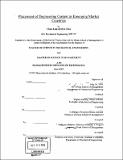| dc.contributor.advisor | Warren Seering and D. Eleanor Westney. | en_US |
| dc.contributor.author | Chen, Chun-Ling Jocelyn, 1972- | en_US |
| dc.contributor.other | Sloan School of Management. | en_US |
| dc.date.accessioned | 2005-06-02T16:06:49Z | |
| dc.date.available | 2005-06-02T16:06:49Z | |
| dc.date.copyright | 2002 | en_US |
| dc.date.issued | 2002 | en_US |
| dc.identifier.uri | http://hdl.handle.net/1721.1/17542 | |
| dc.description | Thesis (S.M.)--Massachusetts Institute of Technology, Dept. of Mechanical Engineering; and, (S.M.)--Massachusetts Institute of Technology, Sloan School of Management, 2002. | en_US |
| dc.description | Includes bibliographical references (leaves 163-165). | en_US |
| dc.description.abstract | GM sponsored this research to assist in its decision to establish an engineering center in India. The objective of this research is to understand the benefits and challenges faced by global companies in China and India. The study focused on a few global companies (Delphi, General Electric, and Motorola) that had engineering centers in both China and India. Two sets of data, direct data and indirect data, were collected. Direct data include responses to surveys sent to managers of these companies as well as personal interviews with executives of these companies. Indirect data include economic data and company profiles from the Internet, journals, company reports, and news releases. The data collected indicate that establishing engineering center in emerging market is beneficial to a global company. Companies that establish engineering centers in China usually benefit from their capabilities in manufacturing and customer service. Companies that establish engineering centers in India usually benefit from their knowledge-based services and the availability of English speaking engineers. Major challenges in these countries include cultural differences between the local employees and the headquarters, lack of technical management resources, and government regulations. Overall, the benefits outweigh the challenges. This research concludes that GM should establish a carefully focused technical center in India that focuses on research relevant to emerging markets or on software development that would have potential benefits to GM. | en_US |
| dc.description.statementofresponsibility | by Chun-Ling Jocelyn Chen. | en_US |
| dc.format.extent | 165 leaves | en_US |
| dc.format.extent | 10015554 bytes | |
| dc.format.extent | 10032979 bytes | |
| dc.format.mimetype | application/pdf | |
| dc.format.mimetype | application/pdf | |
| dc.language.iso | eng | en_US |
| dc.publisher | Massachusetts Institute of Technology | en_US |
| dc.rights | M.I.T. theses are protected by copyright. They may be viewed from this source for any purpose, but reproduction or distribution in any format is prohibited without written permission. See provided URL for inquiries about permission. | en_US |
| dc.rights.uri | http://dspace.mit.edu/handle/1721.1/7582 | |
| dc.subject | Mechanical Engineering. | en_US |
| dc.subject | Sloan School of Management. | en_US |
| dc.title | Placement of engineering centers in emerging market countries | en_US |
| dc.type | Thesis | en_US |
| dc.description.degree | S.M. | en_US |
| dc.contributor.department | Massachusetts Institute of Technology. Department of Mechanical Engineering | |
| dc.contributor.department | Sloan School of Management | |
| dc.identifier.oclc | 51832128 | en_US |
